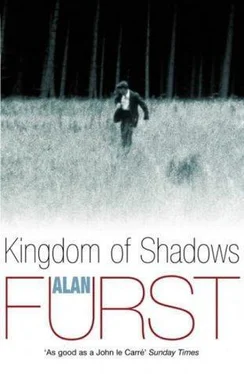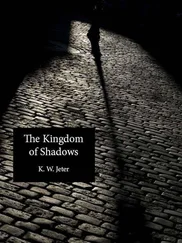Alan Furst - Kingdom of Shadows
Здесь есть возможность читать онлайн «Alan Furst - Kingdom of Shadows» весь текст электронной книги совершенно бесплатно (целиком полную версию без сокращений). В некоторых случаях можно слушать аудио, скачать через торрент в формате fb2 и присутствует краткое содержание. Жанр: Шпионский детектив, на английском языке. Описание произведения, (предисловие) а так же отзывы посетителей доступны на портале библиотеки ЛибКат.
- Название:Kingdom of Shadows
- Автор:
- Жанр:
- Год:неизвестен
- ISBN:нет данных
- Рейтинг книги:5 / 5. Голосов: 1
-
Избранное:Добавить в избранное
- Отзывы:
-
Ваша оценка:
- 100
- 1
- 2
- 3
- 4
- 5
Kingdom of Shadows: краткое содержание, описание и аннотация
Предлагаем к чтению аннотацию, описание, краткое содержание или предисловие (зависит от того, что написал сам автор книги «Kingdom of Shadows»). Если вы не нашли необходимую информацию о книге — напишите в комментариях, мы постараемся отыскать её.
Kingdom of Shadows — читать онлайн бесплатно полную книгу (весь текст) целиком
Ниже представлен текст книги, разбитый по страницам. Система сохранения места последней прочитанной страницы, позволяет с удобством читать онлайн бесплатно книгу «Kingdom of Shadows», без необходимости каждый раз заново искать на чём Вы остановились. Поставьте закладку, и сможете в любой момент перейти на страницу, на которой закончили чтение.
Интервал:
Закладка:
“We can always use a friend in Paris,” they said to him.
Morath declined with a smile.
They were never quite rude, after that. Inquisitive. How did he come to be involved with this? Was he simply an officer in the VK-VI, the Hungarian intelligence service? Had he met Germans ? But it was none of their business and he didn’t tell them and was rescued, in the end, by Simon’s mother, who came out on the terrace and talked and laughed and flirted at them until they went away.
August 1938, the summer before the war. At night, the wireless crackled and the cicadas whirred. The Czechs mobilized, the British fleet mobilized, Benes offered Henlein and the Sudetenlanders everything either of them could think of-starting with complete autonomy and going on from there. But, not enough. In England, gas masks were issued and air-raid trenches dug in London parks. “But what will become of you, Nicholas?” Simon’s mother asked him at the lunch table.
He’d thought about that. More than he wanted to. He supposed he would be called back to duty, told to report to the regimental barracks, amid the chubby stockbrokers and balding lawyers, and ordered to fight alongside the Wehrmacht.
He discovered Cara, one night, wearing the Cartier bracelet, facedown on the bedspread, weeping into the pillow. “I shall tell my father,” she whispered, “that we must sell one of the estancias, because I am going to buy a villa in Lugano.”
At drinks the next day he was, attacked was the only word for it, by a neighbor in an army officer’s uniform, fierce, and crimson with anger. The man had a totally incomprehensible accent-his words disappeared in a thick black mustache-and Morath took a step back and had no idea what to do. It was Simon who saved him, whisking him away because he simply must meet the uncle from Perth. They were terribly, almost violently, kind to him at the house in Sussex. One rainy afternoon, when everyone but Morath and Cara played bridge, they dug deep in a chest and extracted a faded jigsaw puzzle, The Defeat of the Spanish Armada.
Speaking of which:
On the twenty-sixth, the radio reported Admiral Horthy’s visit to the Reich, to Kiel, ostensibly as the last commander in chief of the Austro-Hungarian navy, to christen a new German battleship, the Prinz Eugen, and to have, the BBC said, “private consultations with Chancellor Hitler.” Nobody in the room looked at Morath; all eyes found something else infinitely more interesting. What the BBC didn’t say, the Count Polanyi did, three weeks later when they met in Paris. The whole business was staged so that Hitler could tell Horthy this: “If you want to join in the meal, you must help with the cooking.”
It took two cars to get them all to the railroad station, the maids and the gardener stood by the door when they drove away. The thirty-first of August turned out to be, of course, a diabolically perfect day. The sky chalk-blue, the children’s-book clouds with chiseled edges, the little train from another time. Simon shook his hand and said, “We’ll hope for the best, right?” Morath nodded. Cara dabbed at her eyes with a handkerchief and held on to Francesca as the train pulled in. And Simon’s mother took his hands in hers. She had cool gray eyes and gave him a good long look. “I’m so glad you could come,” she said. “And we do want you to come back, Nicholas. You’ll try, won’t you?”
He promised he would, and held her hands.
NIGHT TRAIN TO BUDAPEST
Paris that September was tense and brooding, on the edge of war, darker than Morath had ever known it. The retour, the return to daily life after the August vacation, was usually a sweet moment in Parisian life, but not that autumn. They came back to the office, the dinner party, the love affair, but Hitler was screaming at them from every newspaper stand and they had no taste for any of it. At Morath’s morning cafe the waiter said, “Let them come and drop their bombs, I’m tired of waiting.”
They couldn’t bear it, the idea of another war-they’d never really recovered from the last one. The man who came home from the trenches and made love to his wife on the day the war ended in 1918 now had a nineteen-year-old son, just the right age for the army. On the sixth of September, the morning papers wondered if the Sudeten issue was really worth a world war. The next day, a Times of London editorial supported partition.
In Germany, the annual Nazi party rally in Nuremberg began on the sixth and was to end on the twelfth, with torchlight parades, gymnastic maidens, and, the grand finale, a speech in the colossal Hall of the Fifty Thousand, where the Fuhrer promised to reveal what he had in mind for the Czechs.
On the tenth, Parisian radio reported Roosevelt’s statement that it was “one hundred percent wrong” to assume the United States would join Britain and France in a war over Czechoslovakia. On the eleventh, the proprietor of the stationery store on the rue Richelieu showed Morath his old Lebel revolver from the Great War. “Well, here is my answer to all this,” he said. Which answer was that? Suicide? Shooting a German tourist? Sniping at the Wehrmacht?
“He has us where he wants us,” Polanyi said, at lunch on the quai de la Tournelle. “Did you see the newsreel of Horthy’s arrival at Kiel station?” Morath hadn’t. “You get a glimpse of me, just over Count Csaky’s shoulder.” Then he described how Hungary had been offered a return of disputed territories if she would agree to march into Slovakia when Hitler attacked the Czechs.
“Horthy declined. On the basis that we barely have an army, and what we have barely has guns and bullets,” Polanyi said, then went on to repeat Hitler’s remark about the meal and the cooking.
They were eating blanquette de veau at a table on the terrace of a Norman restaurant. Polanyi waited while two young men hurried past. “So naturally,” he said, “some units are being recalled to service. But I made sure you weren’t included in that. ” He ran a forkful of fried potatoes through a dish of mayonnaise, then paused before eating and said, “I trust I did the right thing.”
Morath didn’t bother to answer.
“Why waste your life in a barracks?” Polanyi said. “And besides, I need you with me.”
Eight-thirty in the morning on the fourteenth of September-Chamberlain had flown to Berchtesgaden to consult with Hitler-the phone rang in Morath’s apartment. It was Cara, in a voice he’d never heard her use. “I hope you will come over and say good-bye to me,” she said.
He started to say “What-” but she hung up on him.
Twenty minutes later he was there. The door was open, he walked in. Two men in blue smocks were packing Cara’s clothing in the drawers of a large steamer trunk, its wardrobe side already crammed with dresses on little hangers. A third man, bigger than the others, stood and watched them, his arms folded across his chest. A chauffeur or a bodyguard, Morath thought, with a heavy face and a collarless jacket. When Morath came into the room he took a half step toward him and let his arms hang by his sides.
Cara was sitting on the edge of the bed, the Picasso nude in its gold frame held on her knees. “Monsieur Morath,” she said, her voice dull and flat, “allow me to present my father, Senor Dionello.”
A short man, sitting in the bedroom chair, got to his feet. He had a black-and-white mustache and wore a double-breasted suit with black and white stripes and a black Borsalino-style hat. He said “Sir” in Spanish, tipped his hat, and shook hands. It was clear to Morath that he was not pleased to meet his daughter’s forty-four-year-old lover, Hungarian lover, Parisian lover, but he would agree not to make a scene if Morath didn’t.
Читать дальшеИнтервал:
Закладка:
Похожие книги на «Kingdom of Shadows»
Представляем Вашему вниманию похожие книги на «Kingdom of Shadows» списком для выбора. Мы отобрали схожую по названию и смыслу литературу в надежде предоставить читателям больше вариантов отыскать новые, интересные, ещё непрочитанные произведения.
Обсуждение, отзывы о книге «Kingdom of Shadows» и просто собственные мнения читателей. Оставьте ваши комментарии, напишите, что Вы думаете о произведении, его смысле или главных героях. Укажите что конкретно понравилось, а что нет, и почему Вы так считаете.












